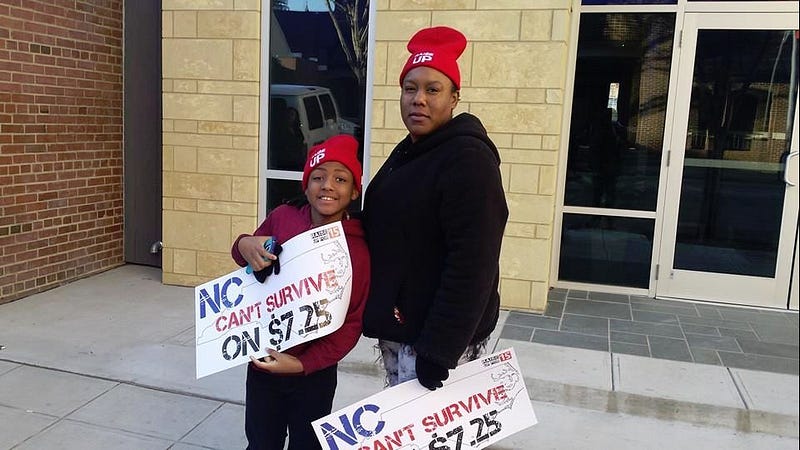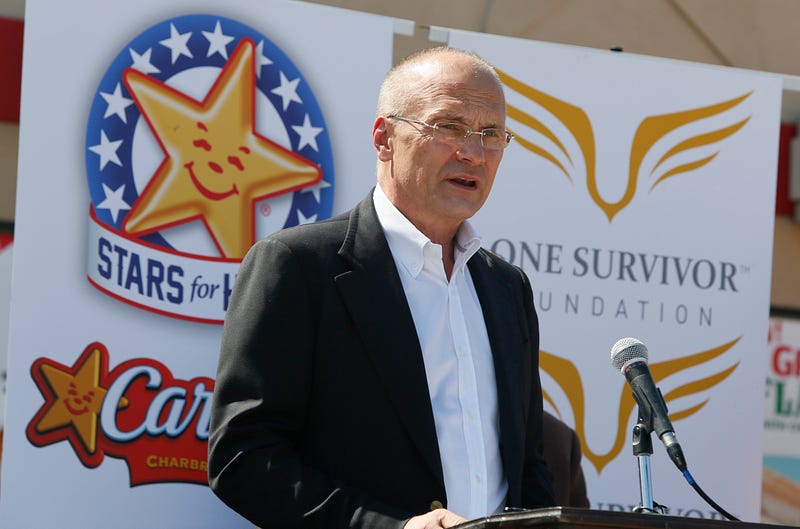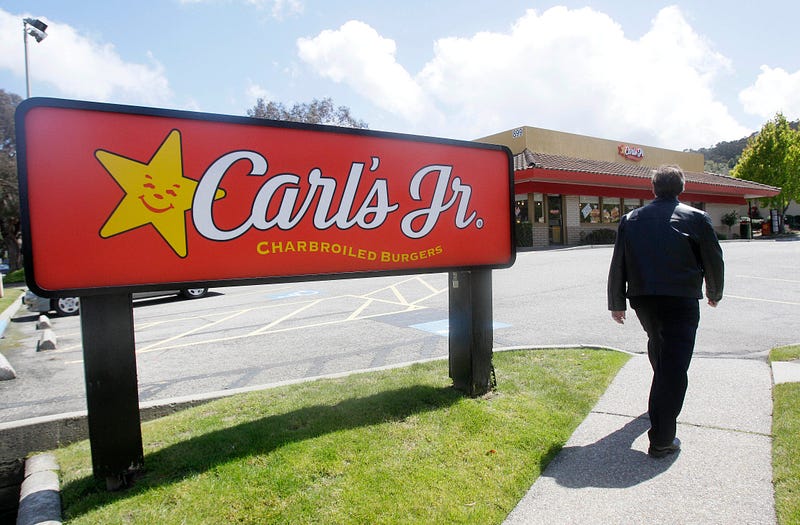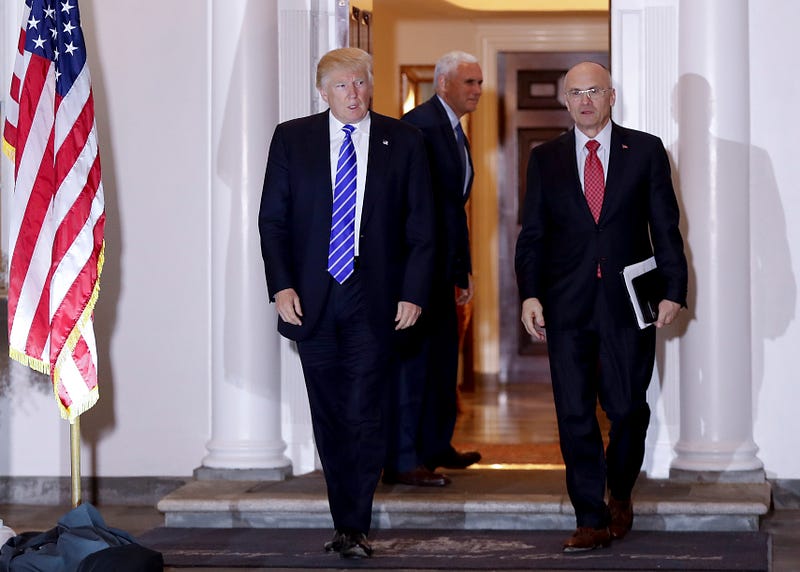By Kira Lerner and Alice Ollstein/Think Progress
Johaunna Cromer never thought she would work at a fast food restaurant. A college graduate, trained psychologist, and former member of the Air Force, she said she used to believe fast food employees were mostly teenagers trying to supplement their allowance.
But in 2014, when her family moved to Asheville, North Carolina to be close to relatives, Cromer ended up taking a position as a manager at a Hardee’s restaurant near her home. Counseling jobs were hard to find, and she needed quick money to support her two children.
The position proved far more trying than she’d ever imagined.
“I learned how hard the work was,” she told ThinkProgress. “And I never thought they would treat people the way they treat people for fighting for what’s right.”
Almost immediately after starting the job, Cromer realized that her $7.25 an hour salary was not sufficient to pay her bills and support her children. She became active in the Fight for 15 movement — a national network of fast-food and other low-wage workers demanding a $15 an hour minimum wage and the right to form a union. She traveled across the country to participate in strikes and protests, gave televised interviews, and encouraged her coworkers to join the movement.
Eight months later, she was fired.
“I was making too much noise, and they were probably afraid of me putting Hardee’s name in a bad light,” she said, alleging that Hardee’s management pressured her coworkers into signing false statements about her workplace conduct.
Cromer says her termination is the product of an anti-union, anti-worker culture at CKE Restaurants, which operates Hardee’s and Carl’s Jr. and whose CEO Andy Puzder was recently nominated by President-elect Donald Trump to lead the U.S. Department of Labor.
Puzder has made his career on the backs of low-paid fast food workers like Cromer, and he has spent the last 16 years overseeing a fast food chain notorious for violating basic wage and hour laws. A review of federal and state court documents and Labor Department inspections paint a picture of a corporate culture that values profit over worker welfare.
People employed by Puzder have sued for discrimination, filed class action lawsuits over the denial of overtime pay, and alleged that they were fired for protesting the chain’s low wages.
Labor law experts have also spoken out against Puzder’s practices. Paul Secunda, director of the Labor and Employment Law Program at Marquette University, told ThinkProgress that Puzder has taken advantage of the fact that fast food workers are a vulnerable population that is easy to abuse.
“They are usually at the bottom of the pay scale, they usually don’t have the sophistication to know their rights under the law, and it’s hard for them to be collective in their approach because they’re moving around so much,” he said. “It’s really easy to manipulate them and exploit them, and that’s what we’ve seen.”
“It would be hard to pick someone who is more anti-labor than this guy for the Labor Department,” he added. And those with first-hand experience with his policies, like Cromer, believe he will lead the country’s workers in a terrifying direction.
“If he can’t even care for his own company, what makes you think he can care for anything else?” Cromer asked.
A thickburger of legal complaints
Cromer said she has filed legal action against the company for her termination, and the litigation remains pending. Many other workers and ex-workers have sued Puzder’s restaurants as well.
In 2009, in response to litigation, CKE Restaurants agreed to treat general managers like hourly, non-exempt employees, entitling them to overtime pay. But the restaurant chain refused to offer back pay to the thousands of workers who had been illegally denied overtime, prompting another class action lawsuit.
“Imagine if you worked for me for ten years and we said, ‘Oh we’ve gotten it wrong. It turns out you were entitled to overtime,’” said Andy Graves, a California attorney who’s representing the managers in two ongoing class actions. “And you said, ‘What about the last ten years?’ And I said, ‘Nah, we’re just changing it going forward.’”
Jose Cubias, who sued the company in 2010, worked at Carl’s Jr. branches around Los Angeles for nearly 30 years, including five years as a general manager. He says he and every other general manager in the state were denied back pay for hundreds of hours of overtime they worked between 2005 and 2009. The company also forced them to say they were on vacation on days they were actually working in order to meet the company’s labor budget, and made them work up to 12-hour shifts without legally-required meal and rest breaks.
“By deliberately failing to pay its employees wages to which they are entitled, CKE avoided substantial expenses and thereby enriched itself at the expense of its employees,” said Cubias’ lawsuit, filed in California state court.
Even after the CKE-owned restaurants changed their policies and agreed to pay managers overtime, they continued to force them to perform unpaid, off-the-clock work outside the restaurant, like reporting to their superiors, tracking down missing employees, and making calls about equipment. Without litigation, Graves explained, many managers had no way to stand up for their rights under California labor law.
“These are people who have eighth-grade educations, they came to the U.S. as teenagers, they’ve done nothing but work for this fast food company for 30 years and the company kind of has them now,” he said. “They can’t do anything else. They’ve given their whole lives to learning how to run a Carl’s Jr., that’s what they do, so they’re exceptionally vulnerable in that way.”
CKE Restaurants did not respond to a request for comment about the ongoing litigation.
Direct liability in an already toxic industry
Graves, who represents fast food workers at several different chains, said the types of violations documented at CKE Restaurants are common in the industry. Though the records of the Labor Department’s inspections are not publicly available, a spokesperson for the Wage and Hour Division described to ThinkProgress some of the most egregious violations the agency documented at CKE-branded facilities.
In 2012, the department discovered that a Hardee’s franchise in Nashville, Tennessee required workers to punch out for breaks when they continued to work, and refused to pay them for those and other hours in violation of minimum wage and overtime laws. They were forced to pay more than $7,500 to 29 employees.
Another investigation of a Hardee’s franchise in Tallassee, Alabama in 2012 and 2013 found that the store failed to pay 19 employees for hours they worked beyond their scheduled hours. They were forced to pay them $2,400.
And while Puzder’s chains are frequent violators of workers’ rights, they don’t appear to be among the worst offenders. The government found violations of the Fair Labor Standards Act more than 60 percent of the times they inspected Carl’s Jr. and Hardee’s restaurants over the past seven years, according to a Bloomberg analysis of Labor Department data. Most national fast food chains had even higher violation rates, with only Jack in the Box, Pizza Hut, and Chick-fil-A ranking better than Puzder’s companies.
“CKE’s record of compliance on wage policies is among the best when compared to our industry peers,” boasted the company’s Executive Vice President & General Counsel in a statement to ThinkProgress. “Bloomberg BNA recently reported that CKE has a ‘fairly clean record’ following their exhaustive analysis.”
Yet the Bloomberg study found that fast food franchises violate their workers’ rights at alarming rates — in part because they operate like small businesses but are held to the same standards as large corporations.
“The franchise system is almost designed to create labor code violations,” Graves said, explaining that franchises operate without corporate legal departments or a human resources departments, but are under pressure to comply with state and federal law.
Puzder is a vocal proponent of franchising. A board member of the International Franchise Association, he has claimed that he and other CKE executives should not be held accountable for violations that occur at their franchises. This view has brought him into conflict with the Obama administration, which has pushed for joint-employer liability — a policy that makes CEOs like Puzder take responsibility for the actions of his franchises.
What makes Hardee’s and Carl’s Jr. stand out is where the abuses occur. The violations did not only happen at franchises, where the company has less liability, but they also happened at sites CKE directly owns.
“The problems in the CKE cases are unusual,” Graves said about his ongoing overtime class action lawsuits. “Usually the reason we see poor treatment of workers has to do with franchisees, and not the actual company… The only thing that stands out about Carl’s Jr. is that the home office did it.”
A Labor Department investigation of corporate-owned branches in St. Louis, Missouri in 2006 and 2007 found that the company failed to properly calculate overtime pay for 456 workers, stiffing them a total of $58,001, which they had to pay in back wages.
A smaller investigation of a Hardee’s-owned location in Birmingham, Alabama between 2013 and 2015 found that the employer made illegal deductions that dropped employees below the minimum wage. They had to pay 20 employees a total of $2,000.
The fox in the hen house
The official mission of the Labor Department is to “improve working conditions; advance opportunities for profitable employment; and assure work-related benefits and rights.” But if Puzder is confirmed to run the agency, he will be in charge of enforcing a host of laws his own company has broken, in addition to other policies he has publicly opposed.
While presiding over a company that has been repeatedly fined and sued for violating existing minimum wage and overtime laws, Puzder has written op-eds and given countless interviews criticizing efforts to expand these benefits.
“Increasing the minimum wage is not the best solution,” he said on Fox News in May. “If we are going to increase the minimum wage at all, we’ve got to keep a lower minimum wage for entry-level workers, or these people are just going to be shut out of the workforce.” Even as a growing number of states and cities increase their minimum wages to $15 an hour, he said he believes it should be no higher than $9.
After President Obama signed an executive order making an additional 4.2 million workers eligible for overtime pay, Puzder wrote a scathing guest postfor Forbes calling the new rule a “harsh reality” for businesses.
“As with the Obama Administration’s other efforts to regulate their way to economic prosperity, it will not deliver as promised,” he said. “In practice, this means reduced opportunities, bonuses, benefits, perks and promotions.”
Puzder has also railed against President Obama’s joint-employer doctrine, which holds CEOs like him accountable for labor abuses committed by franchisees or contractors. He warned it would create “a lose-lose scenario” and “essentially destroy the business model.”
Graves, among others, has a cynical view of Puzder’s appointment. “It’s like putting the fox in charge of the hen house,” he said. “From our point of view, its very concerning.”
As Labor Secretary, Puzder could make sweeping changes impacting the nation’s workforce without ever having to go through Congress. He could scale back the department’s investigations into wage theft and other workplace violations, and ramp up investigations into union activity. He could make it more difficult for laid-off workers to collect unemployment insurance. He could weigh in against workers in lawsuits before the National Labor Relations Board or any federal court in the nation. He could change the government’s official view on who is classified as an employee versus who is an independent contractor, with widespread implications for workplace rights. He could change how many immigrants on temporary work visas are allowed into the United States.
Ironically, many of these changes would adversely impact the very people who voted Trump into office, Secunda predicted.
“The white working class who elected Trump are about to get screwed to a degree that is hard to fathom.”




No comments:
Post a Comment